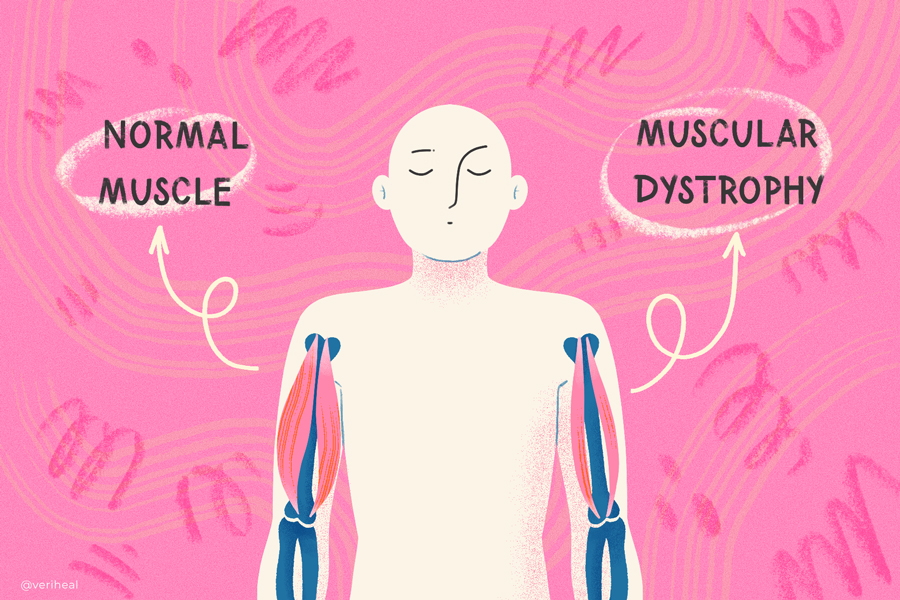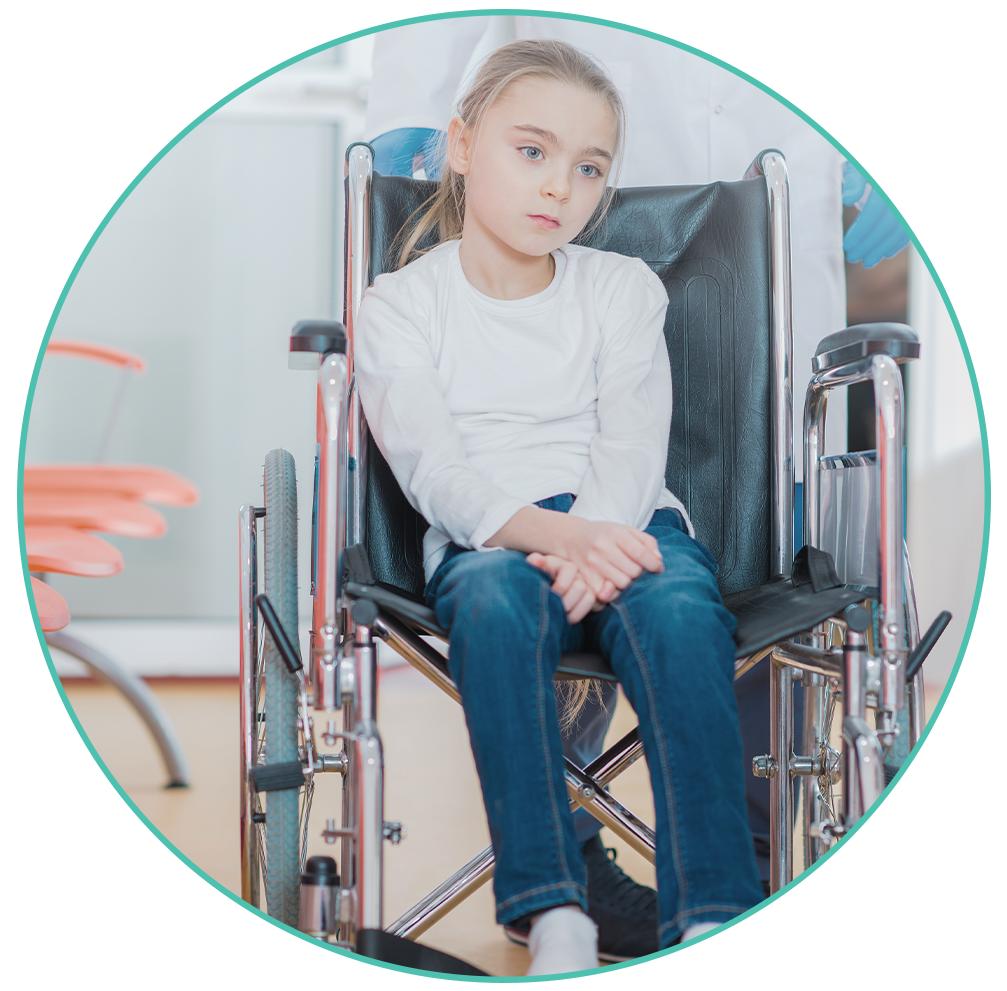Muscular Dystrophies and Medical Cannabis Treatment

- Muscular Dystrophy Treatment: Can Cannabinoids Provide Relief?
- The Role of the Endocannabinoid System in Treating Muscular Dystrophy
- What Preparations of Cannabis are Best for Muscular Dystrophy Patients?
- Muscular Dystrophy: Signs, Symptoms, and Types
- Muscular Dystrophy Causes and Complications
- Talking to Your Doctor About Diagnosis and Treatments
- Complementary Treatments Worth Discussing with Your Doctor
Muscular dystrophies (MD) are a group of muscle diseases caused by mutations in a person’s genes. Over time, muscle weakness decreases mobility, making everyday tasks difficult. This group of more than 30 genetic diseases affects 16 to 25 per 100,000–or around 250,000–people in the United States. On a global scale, 1 in 5,000 males born have MD (1).
The severity of muscular dystrophy depends on the type and the age at which it arises, with the disease varying anywhere from mild to completely disabling (1). Experts estimate less than 50,000 people in the U.S. have DMD, the most common subtype of MD (1). While no cure currently exists for muscular dystrophy, patients may seek out a handful of treatments designed to enhance mobility, as well as boost heart and lung muscle strength (2). Some examples include treadmill strengthening exercises, physical therapy sessions; medications like corticosteroids, antiepileptics, NSAIDs; and even medical cannabis recommendations.
Muscular Dystrophy Treatment: Can Cannabinoids Provide Relief?
A study on the impact of cannabis on Duchenne muscular dystrophy highlighted the therapeutic power of using non-psychoactive cannabinoids like cannabidiol (CBD), cannabidivarin (CBDV), and tetrahydrocannabivarin (THCV) to reduce inflammation and enhance cell and muscle function in animal models. A 2019 preclinical study (3) saw rodents receive the cannabinoids in the form of an injection. Post-treatment, the effects on autophagy and inflammation were assessed with the use of biochemical analyses and locomotor tests.
“In mice, CBD and CBDV prevented the loss of locomotor activity, reduced inflammation, and restored autophagy,” reads an excerpt from the study (3).
The Role of the Endocannabinoid System in Treating Muscular Dystrophy
The body’s endocannabinoid system (ECS) is a widespread signaling system. If it becomes unbalanced, disease or illness might occur. It is designed to maintain something called “homeostasis,” which is the body’s natural, normal state. However, the potential role of endocannabinoids in skeletal muscle disorders is still uncertain, but it may have something to do with regulating underlying cellular functions.
A 2018 study published in the journal Nature (4) signified the role of the endocannabinoid CB1 receptors in cases of Duchenne’s muscular dystrophy. Their findings emphasized the role of CB1 receptors as a target for potential muscular dystrophy therapies because the CB1 gene and receptor interact with key targets.
In mouse and human models, CB1 transcripts illustrate the highest degree of expression at disease onset, before declining as time progresses. Similar alterations were shown for PAX7 – an important regulator of muscle stem cells.
Bioinformatics and biochemical analysis reveal that PAX7 binds and upregulates the CB1 gene in cases of muscular dystrophy more than in healthy muscles. In summary, the researchers identified a “PAX7–CB1 cross-talk potentially exacerbating DMD” and emphasized the role of CB1 receptors as a target for potential therapies.
This cross-talk gives us insight into how we may be able to reduce the activity of CB1, which has the opposite function of THC. This is why cannabinoids like CBD, CBDV, and THCV may improve satellite and skeletal muscle cell function.
What Preparations of Cannabis are Best for Muscular Dystrophy Patients?
Topical balms, salves, and lotions that have been infused with cannabis’ active compounds may be the best choice for localized relief from muscle stiffness and pain.
For fast-acting pain relief, opt for a vape or cannabis oil-filled tincture, the latter of which can be dropped onto the tongue and the effects felt within mere minutes. However, patients with muscular dystrophy will often have respiratory complications, so means of ingestion other than inhalation are advised.
Edibles, pills, capsules, tablets, and dissolvable cannabis are some other preparations available for people with muscular dystrophy to give symptomatic relief from chronic pain.
Muscular Dystrophy: Signs, Symptoms, and Types
The signs and symptoms of muscular dystrophy usually arise in early childhood and differ depending on which type someone has. However, the most common side effects of muscular dystrophy include regular falling, learning disabilities, stunted growth, oversized calf muscles, difficulty running and jumping, problems sitting or standing up, and walking on the toes (1).
Doctors will diagnose one of the following forms of muscular dystrophy:
- Myotonic: Characterized by an inability to relax muscles after experiencing muscle contractions. Facial and neck muscles are normally affected first, causing the patient’s eyelids to drop and necks to sag. Myotonia is the most common form of MD diagnosed in adulthood, and it may also impact heart, lung, and endocrine function.
- Duchenne: A serious type of muscular dystrophy primarily affecting boys from ages 2-6. Muscle degeneration typically occurs in the thighs and pelvis before reaching the arms. Survival beyond age 20 is rare (5).
- Becker: Signs and symptoms are not dissimilar to Duchenne, but they are usually milder and slower to progress. Symptoms can surface in the teen years or during early adulthood. Becker muscular dystrophy is almost exclusively limited to persons born male.
- Limb-girdle: Hip and shoulder muscles become weak first. Lifting the front part of the foot poses a challenge for patients with limb-girdle muscular dystrophy. Onset varies from childhood to the teenage years.
- Facioscapulohumeral: Muscle weakness usually starts in the face, hip, and shoulders. When arms are raised in the air, the shoulder blades might protrude. Disease onset frequently occurs in the teenage years but can also happen in childhood or early adulthood.
- Congenital: Boys are more likely to be affected by this type of muscular dystrophy, which is typically apparent at or near birth. While certain cases are slow-progressing with mild symptoms, others worsen quickly and cause severe physical health impairment.
- Oculopharyngeal: Muscles of the upper eyelids and the throat are affected by this genetic disorder. It happens between the ages of 40 and 70.
- Distal: Also known as “distal myopathy”, this type of muscular dystrophy causes wasting of the voluntary distal muscles, which are the muscles located farthest from the body’s center. This type occurs between 40 and 60 years of age (5).
- Emery-Dreifuss: This slowly progressing type of muscular dystrophy is caused by genetic modifications in the EMD and LMNA genes. The inheritable disease affects people in their childhood to early teens in the muscles of the arms, legs, face, neck, spine, and heart.
Muscular Dystrophy Causes and Complications
Mobility can become a daily challenge for patients who suffer from muscular dystrophy. Eventually, some patients will require an assistive device, such as bracing, a wheelchair, or a walker. The pain caused by contractures can be debilitating. While certain medications can ease discomfort, surgery is sometimes necessary to improve the patient’s range of movement.
Some other complications of muscular dystrophy include breathing difficulties that demand the use of a ventilator and problems eating and swallowing, which may contribute to nutritional deficiencies or aspiration pneumonia. Heart health may be dampened by certain types of MD, and the disease can also trigger scoliosis (6).
Additionally, some patients will need neurological management of their epilepsy and muscle spasms. These are two areas that are well-known in the world of cannabinoid therapy that you should also speak to your doctor about (7).
Talking to Your Doctor About Diagnosis and Treatments
To better understand exactly what type of muscular dystrophy you are dealing with, your doctor or healthcare practitioner may conduct a battery of tests. Your doctor is likely to begin by reviewing your medical history, performing a physical examination, and doing blood labs, followed by one of the following tests:
- Electromyography: The electrical activity of the muscle can be tested with electromyography, which involves the insertion of an electrode needle into the muscle. Changes in electrical activity confirm the presence of muscle disease.
- Enzyme tests: When muscles are damaged, they release enzymes like creatine kinase (CK) into the blood.
- Genetic testing: Gene mutations can be detected with blood sample examinations. This is an effective way to find genes that cause types of muscular dystrophy.
- Muscle biopsy: After making an incision or by using a hollow needle, a small piece of muscle can be removed before it is sent to a laboratory for in-depth analysis. This technique helps doctors to distinguish between muscular dystrophy and other muscle diseases.
- Heart-monitoring tests (electrocardiography and echocardiogram): These tests are used to monitor heart function, particularly in people diagnosed with myotonic muscular dystrophy.
- Lung-monitoring tests: These tests are used to assess lung function and monitor for potential respiratory complications.
After a diagnosis, you can discuss medical marijuana treatment options with a doctor. However, it’s important to note that cannabis should not be used as a substitute for other types of doctor-prescribed medications or treatments such as bracing.
Complementary Treatments Worth Discussing with Your Doctor
To promote a positive healing journey, patients with muscular dystrophy may opt for complementary medicine or what is otherwise known as “complementary therapy.” Such methods aren’t designed to treat the root cause of the medical condition but rather to enhance overall health and potentially speed up the healing process.
Some options include biofield therapies, biological therapies, and body-based therapies involving a therapist. You might also consider trying CBD oil to ease the symptoms of various forms of anxiety and dementia. Currently, there is no evidence to show that cannabis or cannabis oil (CBD oil) can stop, reverse or prevent muscular dystrophy. However, it could help to reduce muscle pain and improve quality of life.
You or a loved one may be considering using an FDA-legal medical cannabis product like Nabilone to improve the behavioral symptoms of muscular dystrophy. While the effects of cannabis can prove beneficial to mental health in older people and adult family members, you must continue using any medication(s) that are prescribed by your doctor.
To learn more about the potential benefits of cannabis on muscular dystrophy and getting a medical marijuana card, contact one of our doctors today.
The content on this page is for informational purposes only and is not intended to be professional medical advice. Do not attempt to self-diagnose or prescribe treatment based on the information provided. Always consult a physician before making any decision on the treatment of a medical condition.
1. Cleveland Clinic. (Updated 2023). Muscular Dystrophy. https://my.clevelandclinic.org/health/diseases/14128-muscular-dystrophy
2. Mayo Clinic. (2022). Muscular dystrophy. https://www.mayoclinic.org/diseases-conditions/muscular-dystrophy/diagnosis-treatment/drc-20375394
3. Effects of non-euphoric plant cannabinoids on muscle quality and performance of dystrophic mdx mice. National Library of Medicine. https://pubmed.ncbi.nlm.nih.gov/30074247/
4. Fabio A. Iannotti, Ester Pagano, Ombretta Guardiola, Simone Adinolfi, Valentina Saccone, Silvia Consalvi, Fabiana Piscitelli, Elisabetta Gazzerro, Giuseppe Busetto, Diego Carrella, Raffaele Capasso, Pier Lorenzo Puri, Gabriella Minchiotti & Vincenzo Di Marzo. (2018). Genetic and pharmacological regulation of the endocannabinoid CB1 receptor in Duchenne muscular dystrophy. Nature. https://www.nature.com/articles/s41467-018-06267-1
5. John Hopkins Medicine. (n.d.). Types of Muscular Dystrophy and Neuromuscular Diseases. https://www.hopkinsmedicine.org/health/conditions-and-diseases/types-of-muscular-dystrophy-and-neuromuscular-diseases
6. Mayo Clinic. (2023). Scoliosis. https://www.mayoclinic.org/diseases-conditions/scoliosis/symptoms-causes/syc-20350716
7. National Academies of Sciences, Engineering, and Medicine; Health and Medicine Division; Board on Population Health and Public Health Practice; Committee on the Health Effects of Marijuana: An Evidence Review and Research Agenda. The Health Effects of Cannabis and Cannabinoids: The Current State of Evidence and Recommendations for Research. Washington (DC): National Academies Press (US). (2017) Therapeutic Effects of Cannabis and Cannabinoids. https://www.ncbi.nlm.nih.gov/books/NBK425767/













